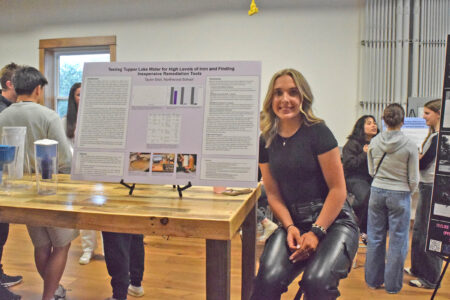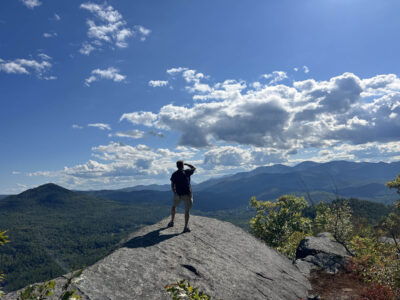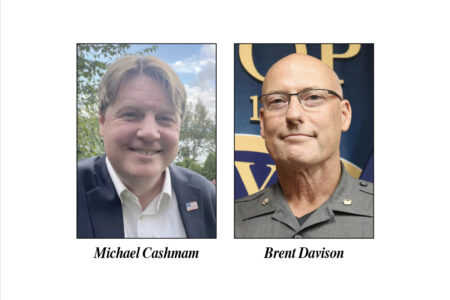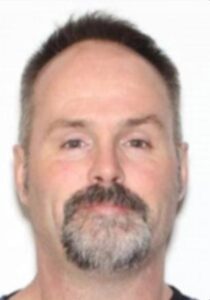Water filters, chargers and fruit flies
Northwood School students present research
- Meghan Crowley speaks with a guest about her research on solar power at Northwood School’s research symposium on Thursday. (Enterprise photo — Grace McIntyre)
- Luke Salibello sits beside a board with his health supplement longevity research at Northwood School’s research symposium on Thursday. (Enterprise photo — Grace McIntyre)
- Taylor Stoll presented her research project on water quality in Tupper Lake at Northwood School’s research symposium on Thursday. (Enterprise photo — Grace McIntyre)

Meghan Crowley speaks with a guest about her research on solar power at Northwood School’s research symposium on Thursday. (Enterprise photo — Grace McIntyre)
LAKE PLACID — In Taylor Stoll’s hometown of Tupper Lake, the water quality is a bit of a running joke.
And so, it also made a perfect subject for her independent research project, which was presented alongside 37 other projects by juniors and seniors at Northwood School’s research symposium on Thursday.
Stoll’s goal was to find the best affordable options for water filters. The one her family uses costs around $200, which she said isn’t necessarily affordable for everyone. She tested samples from residential taps, commercial businesses and a couple of nearby lakes for pH and iron levels. In all of the samples, including from drinking sources, the iron level was above the recommended safe range.
In the end, both the Brita and the Lifestraw were about equally effective at removing most of the iron from the water. She said the lesson she learned from the project was that the Tupper Lake water issue is urgent and important, and her research only recommends ways to offset the problem in the short term.
“Nothing really has been done,” she said, referring to the village’s efforts to address the water problem. “But if you want a short-term fix, there’s the filters I tested.”
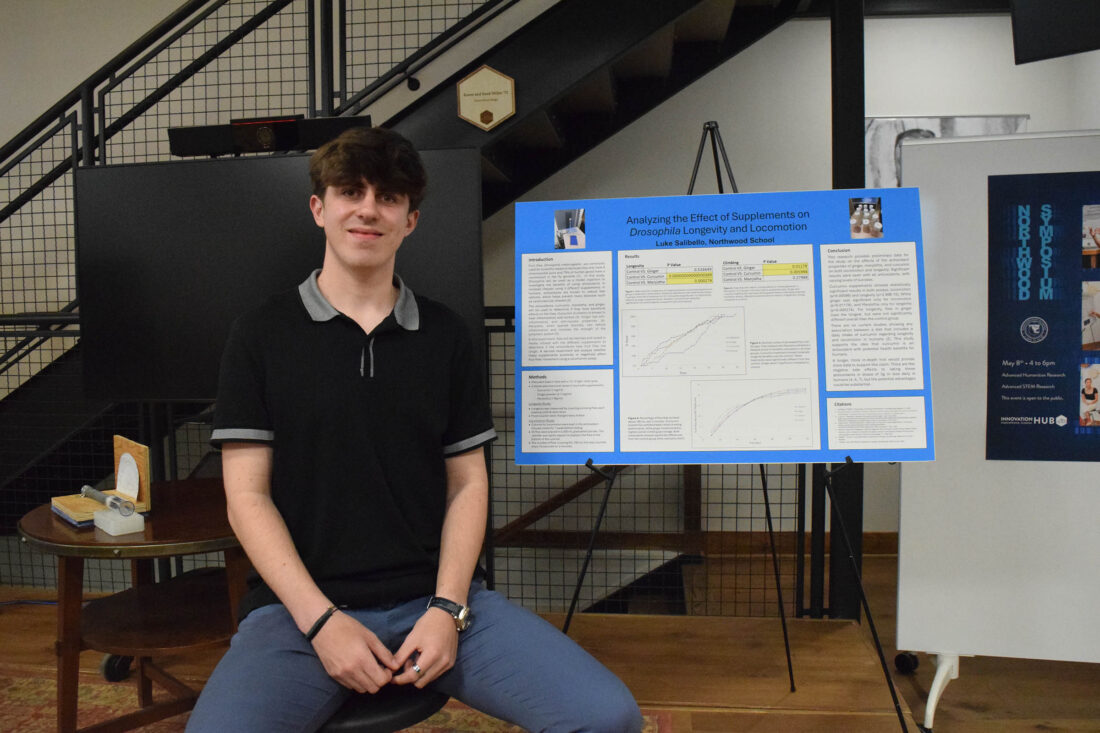
Luke Salibello sits beside a board with his health supplement longevity research at Northwood School’s research symposium on Thursday. (Enterprise photo — Grace McIntyre)
–
A backcountry phone charger
–
Meghan Crowley became interested in solar energy both from an environmental and practical standpoint. Her family has a camp in the Adirondacks that doesn’t have electricity or cell service; but last summer they got a solar panel. She became curious about the technology and wondered: could this be used for something on the smaller scale, like charging a cell phone?
“It kind of just sparked my interest, and being able to learn how they work and how they produce electricity,” Crowley said.

Taylor Stoll presented her research project on water quality in Tupper Lake at Northwood School’s research symposium on Thursday. (Enterprise photo — Grace McIntyre)
She spent months reading papers and looking at designs. She decided on a series design, where panels are connected directly to each other, and the voltages add up across the circuit. There was lots of trial and error in the design process, which was one of the big takeaways for her.
“You have to adapt a lot,” she said. “Things might not always go as planned, but finding an alternative way and just going back to the drawing board and researching.”
–
Long live the … fruit flies?
–
Luke Salibello saw his parents taking supplements like ginger and turmeric (also known as curcumin) and wondered: were these actually doing anything? He decided to put this to the test using a species that is cheap, easy to maintain and still retains about 75% of the same genome as humans: fruit flies.
“They’re cheap, they’re small — I keep them in a tiny little incubator,” he said.
The project took up a full year, but the actual data collection only lasted around 30 days. Every day, Salibello counted the number of dead fruit flies in each group, which were given one of three different supplements, except for the control group, which received no supplements. The three supplements — ginger, curcumin and manjistha — are antioxidants with anti-inflammatory properties. He also included a locomotion study, which measured how many flies climbed up from the bottom of a graduated cylinder.
All three supplements resulted in a significant impact on longevity, Salibello found. The ginger supplement group lived the longest overall. However, the data from the curcumin group had a much smaller p-value, which means those results are less likely to have happened by chance — basically meaning the data is more significant.
Salibello is planning to attend the University of Utah in Salt Lake City next year and hopes to study biomedical engineering. This was one of the other reasons he chose to do this kind of research.
Jill Walker, Northwood science teacher and director of the Advanced STEM Research Program and in the science department, said this program has been picking up steam since it began four years ago. Each year, more students sign up. They get college credit for the class through Paul Smith’s College, and this kind of independent, student-driven work gives them a step up as they apply to colleges, Walker said.
“We like calling it a ‘hook’ for college,” she said. “It gives them sort of an edge in having an independent project instead of just a lot of good classes.”



